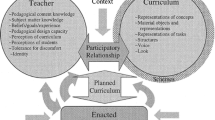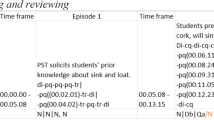Abstract
This study explores teachers’ use of questioning during collaborative science exploratory activities. We classified a total of 755 questions across 14 preschool science lessons implemented by four teachers by type (open- or closed-ended) and content (science or non-science related) while also recording the intended recipient. Results revealed that, overall, teachers primarily asked closed-ended questions to children during preschool science activities. While closed-ended questions outnumbered open-ended, science-related questions were more likely to be open-ended questions. We noticed this trend whether the teacher directed the question to a group of children or an individual child. Gender of the child recipient was also explored with no significant differences found. Results indicate that collaborative science exploratory activities may be an ideal context for increasing teacher’s use of open-ended questions. Background and training of teachers may also play a role in the use of open-ended questions in a science activity context.
Similar content being viewed by others
Change history
13 August 2020
A Correction to this paper has been published: https://doi.org/10.1007/s10643-020-01098-6
References
Bian, L., Leslie, S. J., & Cimpian, A. (2017). Gender stereotypes about intellectual ability emerge early and influence children’s interests. Science, 355(6323), 389–391.
Burchinal, M., Hyson, M., & Zaslow, M. (2008). Competencies and credentials for early childhood educators: What do we know and what do we need to know? NHSA Dialog Briefs, 11(1), 1–8.
Catsambis, S. (1995). Gender, race, ethnicity, and science education in the middle grades. Journal of Research in Science Teaching, 32(3), 243–257.
Crowley, K., Callanan, M. A., Tenenbaum, H. R., & Allen, E. (2001). Parents explain more often to boys than to girls during shared scientific thinking. Psychological Science, 12, 258–261.
De Rivera, C., Girolametto, L., Greenberg, J., & Weitzman, E. (2005). Children’s responses to educators’ questions in day care play groups. American Journal of Speech-Language Pathology, 14(1), 14–26.
Egert, F., Fukkink, R. G., & Eckhardt, A. G. (2018). Impact of in-service professional development programs for early childhood teachers on quality rating and child outcomes: A meta-analysis. Review of Educational Research, 88(3), 401–433.
Eshach, H., & Fried, M. N. (2005). Should science be taught in early childhood? Journal of Science Education and Technology, 14(3), 315–336.
Fuson, K. C., Kalchman, M., & Bransford, J. D. (2005). Mathematical understanding: An introduction. In M. S. Donovan & J. D. Bransford (Eds.), How Students Learn: Mathematics in the Classroom (pp. 217–256). Washington, DC: The National Academies Press.
Gandini L, Goldhaber J. (2001). Two reflections about documentation. In L. Gandini, C. Pope Edwards (Eds.). Bambini the Italian approach to infant/toddler care (124–145). New York: NY: Teachers College Press.
Gerde, H. K., Pierce, S. J., Lee, K., & Van Egeren, L. A. (2018). Early childhood educators’ self-efficacy in science, math, and literacy instruction and science practice in the classroom. Early Education and Development, 29(1), 70–90.
Hamlin, M., & Wisneski, D. B. (2012). Supporting the scientific thinking and inquiry of toddlers and preschoolers through play. Young Children, 67(3), 82.
Hargreaves, D. H. (1984). Teachers’ questions: Open, closed and half open. Educational Research, 26(1), 46–51.
Heroman, C., Burts, D. C., Berke, K., & Bickart, T. S. (2010). The Creative Curriculum for preschool—Volume 5, Objectives for development & learning: Birth through kindergarten. Washington, DC: Teaching Strategies LLC.
High/Scope Educational Research Foundation. (2003). Preschool child observation record (2nd ed.). Ypsilanti, MI: High/Scope Press.
Hong, S. Y., Torquati, J., & Molfese, V. J. (2013). Theory guided professional development in early childhood science education. Learning Across the Early Childhood Curriculum (pp. 1–32). Bingley, United Kingdom: Emerald Group Publishing.
Honing, A. S., & Hirallal, A. (1998). Which counts more for excellence in childcare staff-years in service, education level or ECE coursework?. Early Child Development and Care, 145, 31–46.
Howe, N., Jacobs, E., Vukelich, G., & Recchia, H. (2011). In-service professional development and constructivist curriculum: Effects on quality of child care, teacher beliefs, and interactions. Alberta Journal of Educational Research, 57, 353–378.
Huinker, D., & Bill, V. (2017). Taking action: Implementing effective mathematics teaching practices in K-grade 5. Reston, Virginia: National Council of Teachers of Mathematics.
Kallery, M., & Psillos, D. (2002). What happens in the early years science classroom? European Early Childhood Education Research Journal, 10(2), 49–61. https://doi.org/10.1080/13502930285208951.
Kostelnik, M., Whiren, A., Soderman, A., Rupiper, M. L., & Gregory, K. (2015). Guiding children's social development and learning. Scarborough, Ontario: Nelson Education.
Kotte, D. (1992). Gender differences in science achievement in 10 countries: 1970/1971 to 1983/84. New York: Peter Lang.
Leibham, M. B., Alexander, J. M., & Johnson, K. E. (2013). Science interests in preschool boys and girls: Relations to later self-concept and science achievement. Science Education, 97, 574–593.
Martin, D. J. (2003). Elementary science methods: A constructivist approach (3rd ed.). Belmont, CA: Thomson/Wadsworth Inc.
Morgan, P. L., Farkas, G., Hillemeier, M. M., & Maczuga, S. (2016). Science achievement gaps begin very early, persist, and are largely explained by modifiable factors. Educational Researcher, 45(1), 18–35.
National Association for the Education of Young Children (NAEYC). (2013). All criteria document, 17–18. Retrieved from https://www.naeyc.org/files/academy/file/AllCriteriaDocument.pdf
National Research Council (NRC). (2012). A framework for K–12 science education: Practices, crosscutting concepts, and core ideas. Washington, DC: National Academies Press.
Nebraska Department of Education. (2018). Early learning guidelines: Nebraska’s birth to five learning and development standards. Lincoln, NE. Retrieved from https://cdn.education.ne.gov/wp-content/uploads/2018/06/ELG-PDF.pdf.
Pendergast, E., Lieberman-Betz, R. G., & Vail, C. O. (2017). Attitudes and beliefs of prekindergarten teachers toward teaching science to young children. Early Childhood Education Journal, 45(1), 43–52.
Rowe, M. B. (1986). Wait time: Slowing down may be a way of speeding up! Journal of Teacher Education, 37(1), 43–50.
Siry, C., Ziegler, G., & Max, C. (2012). “Doing science” through discourse-in-interaction: Young children’s science investigations at the early childhood level. Science Education, 96(2), 311–326.
Teaching Strategies for Early Childhood. (2010). Research foundation: Teaching Strategies GOLD Assessment System. Retrieved from https://teachingstrategies.com/wp-content/uploads/2017/03/Research-Foundation-GOLD-2010.pdf.
Tobin, K. (1987). The role of wait time in higher cognitive level learning. Review of Educational Research, 57(1), 69–95.
Tu, T. H., & Hsiao, W. Y. (2008). Preschool teacher-child verbal interactions in science teaching. Electronic Journal of Science Education, 12(2), 1–23.
Vygotsky, L. S. (1962). Thought and language. Cambridge, MA: MIT Press.
Wimer, J. W., Ridenour, C. S., Thomas, K., & Place, A. W. (2001). Higher order teacher questioning of boys and girls in elementary mathematics classrooms. Journal of Educational Research, 95(2), 84–92.
Yoon, J., & Onchwari, J. A. (2006). Teaching young children science: Three key points. Early Childhood Education Journal, 33(6), 419–423.
Author information
Authors and Affiliations
Corresponding author
Additional information
Publisher's Note
Springer Nature remains neutral with regard to jurisdictional claims in published maps and institutional affiliations.
Rights and permissions
About this article
Cite this article
Hamel, E., Joo, Y., Hong, SY. et al. Teacher Questioning Practices in Early Childhood Science Activities. Early Childhood Educ J 49, 375–384 (2021). https://doi.org/10.1007/s10643-020-01075-z
Published:
Issue Date:
DOI: https://doi.org/10.1007/s10643-020-01075-z




